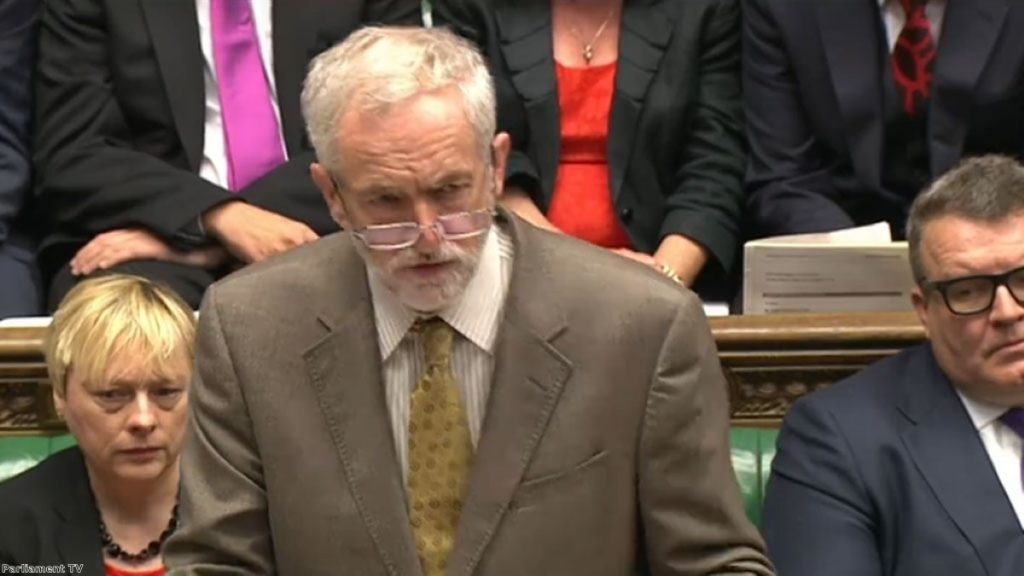The great truth-saying, plain-speaking Jeremy Corbyn is not being quite as truth-saying or as plain speaking as he would have us believe.
During the first hustings debate against Owen Smith last night, the Labour leader came under fire for emerging the day after the referendum and saying we should trigger Article 50.
“I thought it as a real mistake for us to come off the back of the Brexit vote and say let’s trigger Article 50,” Smith said.
“No I didn’t say that,” Corbyn replied.


A little later he confessed: “Maybe I could have chosen my words more carefully at the point.”
Confusion over Article 50https://t.co/hVPnt6QOpc
— Owen Smith 2016 (@owensmith2016) August 4, 2016
Corbyn’s integrity is probably the attribute his supporters most often mention about him. But one struggles to square these comments with what he said on June 24th. Back then he said:
“The British people have made their decision. We must respect that result and Article 50 has to be invoked now so that we negotiate an exit from European Union.
“Obviously there has to be strategy but the whole point of the referendum was that the public would be asked their opinion. They’ve given their opinion. It is up for parliament to now act on that opinion.”
‘Article 50 has to be invoked now’ seems pretty unequivocal, although even this morning there are Corbyn supporters out there trying to suggest that this did not mean what it quite evidently was intended to mean.
Corbyn’s refusal to admit to this shows he really isn’t all that different to normal politicians. When he’s in trouble, he dodges, he redefines, he makes stuff up.
But it shows another way in which he’s similar to other politicians too: he doesn’t know what he’s talking about.
There are those out there – precious few in number really – who want to invoke Article 50 immediately. It’s a mad view to hold. Once that punishing two-year timetable is activated we are at a very significant negotiating disadvantage. It’s less than half the time you’d need – less than a quarter really – to extricate yourself from decades of legal arrangements or set up some sort of trade arrangement. Once activated, the EU and its member states hold all the cards. When to activate it is one of our only bits of leverage. That’s why even really quite fevered Brexiters are opposed to triggering it too quickly. This isn’t a Leave vs Remain issue: it’s about having a credible and effective negotiating strategy.
But Corbyn emerged after the referendum and suggested we give our one bit of leverage away. That wouldn’t have been his intention. In his mind he clearly thought that was what you did when you just lost an EU referendum. After all, it was what Cameron had (cynically) promised during the campaign in the event of a loss, while presumably knowing he intended to do no such thing.
But the fact Corbyn made this statement, as leader of the opposition, the day after the referendum, shows he had no understanding of the ramifications of what he was saying. He was just talking, without any comprehension of the issue, at a crucial moment for the country. To be so badly briefed on such vital matters when you hold a prominent political position is a crime in and of itself.
As it happens, he’s in good company. Most of our current leading politicians appear to have no idea what they’re talking about.
Philip Hammond, the actual chancellor, kept switching between saying Britain would stay in the single market or leave it, as if there were little difference between the two options.
Liam Fox, the actual minister for international trade, went around the world promising trade deals seemingly without realising that they were logically and legally impossible to do without having finalised our relationship with the EU.
David Davies, the actual Brexit secretary, presumed firstly that Fox could do so and secondly that he would come back with deals representing markets bigger than the sum total that exist on this planet.
None of them have any idea what they are talking about and we can only hope that they are spending the summer being instructed rather more effectively than they had been before it.
Corbyn is no worse than these men. But his Article 50 comments, and his decision last night to pretend they didn’t happen, show he’s certainly no better.
Ian Dunt is the editor of Politics.co.uk
The opinions in politics.co.uk's Comment and Analysis section are those of the author and are no reflection of the views of the website or its owners









